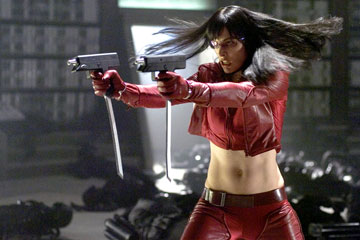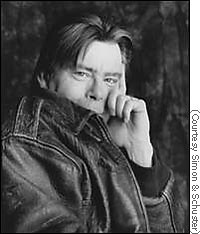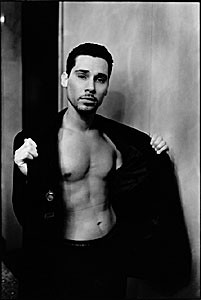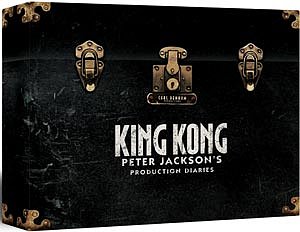The New Yorker finds the Academy picks to be B_O_R_I_N_G
By Hollywood standards, the nominees for the 78th annual academy awards are old news. It’s been a almost a whole seven hours since word got out this morning at the crack of dawn, about who was in the running for those beloved little gold statuettes. Since then, chatter has been everywhere –the internet, the radio, people gabbing about how now more than ever the “serious” and “intelligent” films are really getting the recognition they deserve.
In case you haven’t look at the list of nominees yet, here is a brief run down:
BEST PICTURE
BROKEBACK MOUNTAIN
CAPOTE
CRASH
GOOD NIGHT, AND GOOD LUCK.
MUNICH
**The directors of each of these films were nominated for best directing, so we’re talking, Ang Lee, Bennet Miller, Paul Haggis, George Clooney, and Steven Speilberg.
ADAPTED SCREENPLAY
BROKEBACK MOUNTAIN
CAPOTE
THE CONSTANT GARDENER
A HISTORY OF VIOLENCE
MUNICH
ORIGINAL SCREENPLAY
CRASH
GOOD NIGHT, AND GOOD LUCK.
MATCH POINT
THE SQUID AND THE WHALE
SYRIANA
As I was driving in my car this morning listening to NPR, I heard an entertainment commentator talk about how the “NPR audience” was “to blame” for the change in certain independent type films coming to the forefront. The NPR anchor (on the show Day to Day) then asked the commentator why he used the word “blame”? Wasn’t it a good thing that “real” and “smart” movies were finally being made and recognized?
Oh it was all enough to make me puke.
Don’t get me wrong, I like NPR, and being “smart” and all is great, but why does everyone, excuse my language, have to run around with such a stick up their a**. Because I thought Capote was terrific, and Munich was a very interesting film, and Good Night and Good Luck looked great, –but what about Batman Begins? What about King Kong? Batman Begins only garnered a single nomination in Cinematography, but I think it should have also been nominated for Best Original Screenplay, Best Directing, and Best Picture. I would have nominated the screenplay for Batman Begins over The Squid and the Whale, which was an intriguing movie but not particularly splendid. King Kong was nominated for Art Direction, Sound Editing, Sound Mixing, and Visual FX, but I also think it should have been nominated for Directing and Best Picture. In fact looking at the Best Actress nominations, I think if they are going to go ahead and nominate Charlize Theron in North Country, they should in turn nominate Naomi Watts for Kong too –because Watts was better than Theron.
I also thought that Star Wars: Episode III was sorely missing from some of the more technical awards. I would have bumped out the dreary, drab Art Directed Harry Potter and the Goblet of Fire, and replaced it with Revenge of the Sith, for its gorgeous interiors, and beautiful spacescapes. Also how is it possible that Sith did not get a nomination for Visual Effects? How did that happen?!
Now I haven’t seen Crash and I haven’t seen Brokeback Mountain yet, which are two major contenders in this oscar race. While I think it’s a good thing that Brokeback Mountain is getting recognition despite of its controversial subject matter, to me a love story is a love story is a love story, which might be well acted and beautifully portrayed, but is also typically boring. I think of all the films that was smothered in nominations the one that seems the most surprising is Good Night and Good Luck. I thought the most impressive element about this film was its visuals. So I think it properly deserved its nominations in Cinematography, and Art Direction. But McCarthyism isn’t exactly a novel topic, and while Edward R. Murrow’s story is both significant and interesting, the film was very heavy handed, and bordered on its own brand of propaganda. Another surprising omission to me in the nominees was Walk the Line in the catagories of Best Adapted Screenplay, Best Directing and Best Picture. I am not usually one for a bio-pic but I thought this film was really quite good, and certainly Oscar fare. The way that James Mangold pieced together the story of Johnny Cash’s life was both compelling and original. I actually thought this film was better than Ray, which was nominated in all those catagories, and I think at the very least it should have gotten a screenplay nod.
Why is it that when the Academy looks at a film like Batman Begins they think, “Ridiculous –it’s about a man who dresses up like a bat,” instead of “This is really a movie about fear and violence and revenge. It’s about learning how to deal with one’s internal demons, in a way which might mean incorporating them into oneself instead of banishing them.” And why is it that when they look at King Kong they think “It’s merely a movie about a gigantic ape,” instead of “This is a film about alienation, about man kind’s fear and wonder of the wilderness within his own heart, and about the unavoidable conflict between man’s desires to cherish and destroy that which he loves.”
What makes a movie “serious” anyway? Is it a lack of comedy? That certainly seems to be part of it, as comedies are traditionally snubbed at the Oscars. Is it a lack of ground breaking visuals? That too, seems to be part of the package since, with the exception of the recent Lord of the Rings victory, films with massive visual FX are ommitted from the nominee list. Must it be grounded in historical events, and forego anything imaginative or fantastical?
The Academy seems to be narrowing down further and further its criteria for who it chooses to nominate. Cinema is such a vast medium, and there are such of a variety of different films out there. Shouldn’t the award show with the highest profile in the world properly reflect diversity? Isn’t the race more exciting and balanced, when you have a blockbuster fantasy extravagnaza, next to a small, independent bio-pic? Apparently, according to the Academy, the answer to these questions is no.







